|
25 September 2006
Savusavu, Vanua Levu, Fiji S 16.48.661 E 179.19.947 (note we are now east)
Fiji and Vanuatu
Savusavu
The minister's deep rich voice is enshrouded by the melodies from the ladies in the choir as he calls revival attendees to the alter. The catchers must be getting a workout this morning since from our anchorage you can hear a good number of "halleluiahs". In the two hours proceedin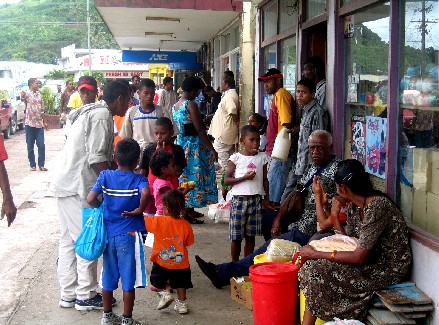 g the minister, the air has been filled with joyous choir music performed in English. Now inspired sermonizing is coming over the loud speaker system at an intensity that must require several dew rags to keep the perspiration from splattering the attendees in the front row. The preaching is in Fijian so we are uncertain of the message but in your mind you can picture a barrel chested Jimmy Farwell with microphone in hand. The service started at 10:00 am and will conclude at noon. We know because this is the fourth day we have failed to be "in the moment" enough to go see exactly what was happening. We aren't complaining mind you, in fact the revival brings a certain amount of entertainment to our day. We would have preferred to have left the anchorage several days ago but a low has settled in over the area bringing robust winds and rain. The harbor offers good protection thanks to the mountains to the east of us but outside it is blowing like "stink". Not only are the winds stiff but they are from the direction of travel with gust to 50 knots. In the last few days boats sticking their noses out quickly returned. So we sit on the boat and listen to the preaching, go in for happy hour and watch the weather. At the first shift in the wind, a number of boats including Shiraz will leave. g the minister, the air has been filled with joyous choir music performed in English. Now inspired sermonizing is coming over the loud speaker system at an intensity that must require several dew rags to keep the perspiration from splattering the attendees in the front row. The preaching is in Fijian so we are uncertain of the message but in your mind you can picture a barrel chested Jimmy Farwell with microphone in hand. The service started at 10:00 am and will conclude at noon. We know because this is the fourth day we have failed to be "in the moment" enough to go see exactly what was happening. We aren't complaining mind you, in fact the revival brings a certain amount of entertainment to our day. We would have preferred to have left the anchorage several days ago but a low has settled in over the area bringing robust winds and rain. The harbor offers good protection thanks to the mountains to the east of us but outside it is blowing like "stink". Not only are the winds stiff but they are from the direction of travel with gust to 50 knots. In the last few days boats sticking their noses out quickly returned. So we sit on the boat and listen to the preaching, go in for happy hour and watch the weather. At the first shift in the wind, a number of boats including Shiraz will leave. 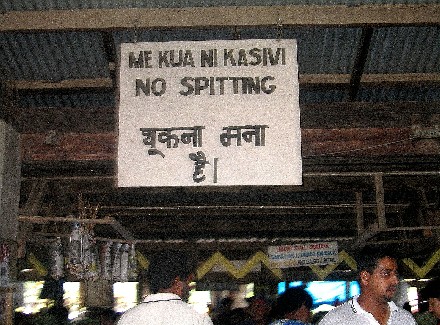
Fiji, although Melanesian, has adopted many Polynesian traditions and cultural characteristics since there has been a great deal of immigration. However the largest group of immigrants came from India when the British colonialists were seeking workers for the copra and sugar plantations. Today Indians make up 44 % of the population and bring a rich mix of culture, religion and food. There has been some racial strife and political unrest and the Indian population has been declining the last few years.
Fiji became a sovereign nation and Commonwealth member in 1970 after almost 100 years of British colonial rule. In1987 political upheaval and several military coups created undesirable elements in the government and the British booted them out of the Commonwealth. They must be back in good graces today since Queen Elizabeth adorns all Fijian currency.
The sail to Savu Savu on the island of Vanua Levu from Tonga was one of our most pleasant in many weeks. Gentle breezes pushed us westward and right into large fields of floating pumice. This light weight rock comes from underwater volcanoes spewing lava which when quickly cooled turns into floating pumice. Fortunately we only encountered small 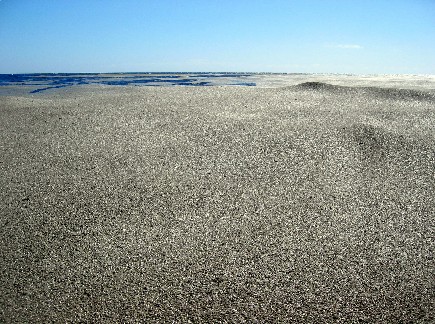 patches. Boats headed to Suva reported fields a quarter mile or more diameter and a foot thick. Upon our arrival in Savusavu we found that what bottom paint left on the boat had been scoured clean. Savusavu is a small but pleasant town with a large mooring field in the harbor which is operated by the Copra Shed Marina. We found the entire town to be cruiser friendly. The primary shaker and mover in the yachtie circle is a New Zealander named " Curley" who has lived in Fiji for the past 35 years and runs a radio net each morning. So if you happen to leave your VHF radio on during the night, as we do, then you will be awakened bright and early the next morning with a "Gooooood Morning Savu Savu". He also conducts seminars on cruising the islands and Fijian culture, especially the social custom of drinking kava or "yaqona". We attended several seminars and would recommend them especially if you plan to spend several weeks in the outer islands. "Curly" also offers clearance to the Lau and Explorer Islands. He highly recommends a visit to these isolated cruising grounds. The problem is, to visit these islands you must get clearance and then head back east. It is strictly forbidden to stop on the way through. Several boats arrived in Lau without clearance and were readily tracked down by officialdom. patches. Boats headed to Suva reported fields a quarter mile or more diameter and a foot thick. Upon our arrival in Savusavu we found that what bottom paint left on the boat had been scoured clean. Savusavu is a small but pleasant town with a large mooring field in the harbor which is operated by the Copra Shed Marina. We found the entire town to be cruiser friendly. The primary shaker and mover in the yachtie circle is a New Zealander named " Curley" who has lived in Fiji for the past 35 years and runs a radio net each morning. So if you happen to leave your VHF radio on during the night, as we do, then you will be awakened bright and early the next morning with a "Gooooood Morning Savu Savu". He also conducts seminars on cruising the islands and Fijian culture, especially the social custom of drinking kava or "yaqona". We attended several seminars and would recommend them especially if you plan to spend several weeks in the outer islands. "Curly" also offers clearance to the Lau and Explorer Islands. He highly recommends a visit to these isolated cruising grounds. The problem is, to visit these islands you must get clearance and then head back east. It is strictly forbidden to stop on the way through. Several boats arrived in Lau without clearance and were readily tracked down by officialdom.
Lautoka
Okay, we're underway now and the wind and current have us moving at 8 knots with a double reefed main. The seas are not bad but it almost doesn't matter, we are away from Savusavu and headed to Lautoka to get chest x-rays. Whoopee! What chest x-rays?
We have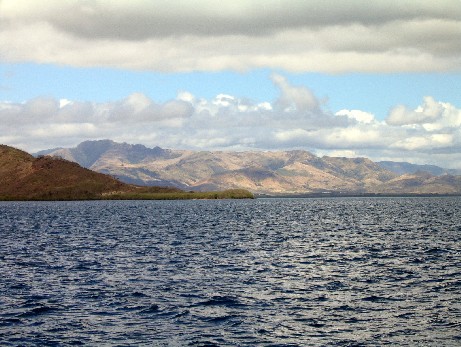 applied on-line for a 12 month visa for Australia and they require a chest x-ray if you have lived in a country outside the US for more than three months during the last five years. We have not run into this requirement before but there is a stiff fine if you just show up without a visa. We were also required to supply financial data to prove we could support ourselves while in Australia. If you can, apply for your visa while in the US. We entered the reef at the Malake Passage but would not recommend this entry. At one point we were surrounded by brown water and coral heads. Our friends on S/V Sandpiper entered one entrance up from us at the Nananu Passage and said that it was straight forward. Once behind the reef, however, it is very calm and beautiful. applied on-line for a 12 month visa for Australia and they require a chest x-ray if you have lived in a country outside the US for more than three months during the last five years. We have not run into this requirement before but there is a stiff fine if you just show up without a visa. We were also required to supply financial data to prove we could support ourselves while in Australia. If you can, apply for your visa while in the US. We entered the reef at the Malake Passage but would not recommend this entry. At one point we were surrounded by brown water and coral heads. Our friends on S/V Sandpiper entered one entrance up from us at the Nananu Passage and said that it was straight forward. Once behind the reef, however, it is very calm and beautiful.
Procuring an x-ray was made easy quite by happenstance. As we were walking out of the Queen's Dock, we were offered a ride by a gentleman who took us to the hospital and recommended that Dr Raj in radiology be our first contact. We were whisked through the process by Dr Raj and when finished he called his favorite Chinese restaurant and told them we were coming for lunch and then invited us to the North Club as his guest that afternoon since he was playing tennis that evening. We along with Tom and Amy on Sandpiper, went to the club , drank a few beers and had a good time. It rained so we didn't stay ar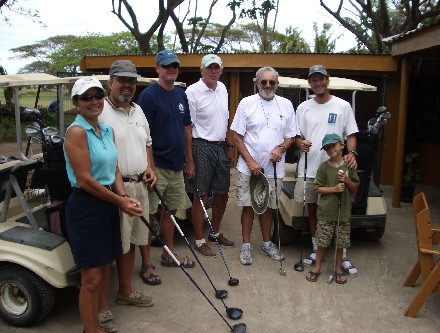 ound for the tennis match. ound for the tennis match.
Lautoka is called the "Sugar City" because the main sugar processing facility of Fiji is located there. The sugar harvest was almost complete and a week long festival was underway during our visit. The problem we encountered was that the sugar mill spewed black ash all day long and worse yet fields were being torched creating a thick black smoke from the surrounding hillsides. Soot and black ash covered our boat the first night so we ran from Lautoka as fast as we could. Too bad since the city was nice and the people were some of the most helpful and gracious we have had the pleasure to meet in our four years of cruising.
Musket Cove
We next made our way to Musket Cove which is a collection of resorts on Malolo Lailai island. It's one of those places where when you tie up to a mooring ball think in terms of weeks not days. Mooring balls are $10 Fijian per day and a membership in the Yacht Club is $1 for the captain. The bar closest to the dinghy dock has barbeque fires where you can bring your own food to cook. Or you can have one of the local re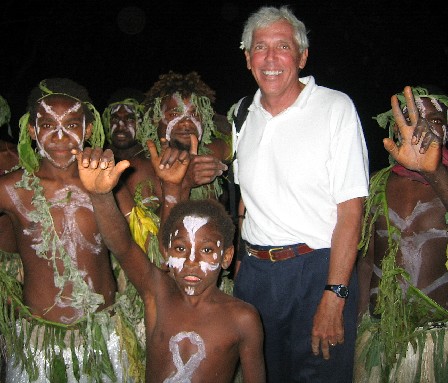 staurants or the grocery store make up meals for you to grill. For our friends Tom and Anna on S/V Stormsvalen, a Norwegian flagged vessel, it was the first barbeque they had ever been to. staurants or the grocery store make up meals for you to grill. For our friends Tom and Anna on S/V Stormsvalen, a Norwegian flagged vessel, it was the first barbeque they had ever been to.
The resort offers a "no brainier" atmosphere where you can charge everything to your club membership and there is about anything you may want to do at any of the several resorts. The prices are resort prices but 10 miles away you can find groceries at half the prices as here, but hey we travel with our own groceries. You can go snorkeling for $5.00 Fijian (about $3.10 USD) or take your own dinghy. Most guest of the resort are from New Zealand and it may have been spring break because they were a great many youths visiting along with their parents.
Due to the bad air we described in Lautoka, we have banned with six other boats to have check out formalities conducted at Musket Cove rather than take the boat back to soot and grim. The officials will ferry in tomorrow.
En Route to Vanuatu
We departed for Vanuatu in the company of several boats and enjoyed fresh breezes on a close haul and seas on the beam. On the second morning out our main sail came slamming down. The webbing that holds the headboard to the block had chafed through so that meant a trip to the top of the mast to recover the halyard. No thanks, not in these seas. We'll just sail with the jib.
We were headed for Tanna, a small island in the southern part of Vanuatu, to visit the volcano that puts on a good show from what we understand. However the next morning a gust at 38 knots split a seam in our jib so now we have no sails. But fortunately we have plenty of fuel. We changed directions and headed to Port Villa and motored the last 36 hours arriving late at night. We make it a point not to enter harbors at night but Port Villa was wide open and well lit so we glided in and set the hook in 80 feet of water after skidding 100 meters or so across the anchorage.
Vanuatu was administered by the French and English at the same time and this system went on for 100 years. Two justice systems, two educational systems, and hey which side of the street do you drive on. Well all these things were worked out and the mixture of French and English seems to have left the best of both imprinted on the Melanesian culture. As in all the South Pacific the islands were greatly influenced by WWII. In 1970 the islands gained an independent status and quickly came to understa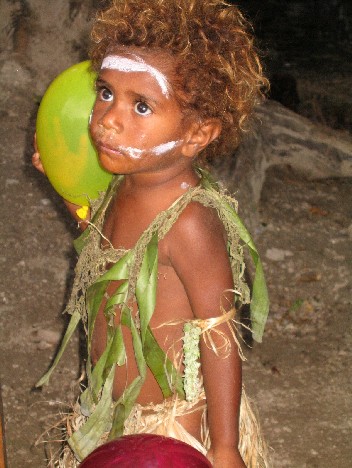 nd tourism and duty free. There are many small resorts, lots of good diving and snorkeling, a few golf courses and wonderful restaurants. The weather has been terrible and the season is coming to an end and we have been unable to visit any of the outlying islands. nd tourism and duty free. There are many small resorts, lots of good diving and snorkeling, a few golf courses and wonderful restaurants. The weather has been terrible and the season is coming to an end and we have been unable to visit any of the outlying islands.
The stories from James Michener, Tales of the South Pacific are mostly taken from these islands which were once called the New Hebrides. Boar tooth bracelets are cultured (like cultured pearls?) in Vanuatu and are so much of the history and lore that the locally brewed beer is called Tusker. Even the Vanuatu flag has the rounded boar tusk on it along with every piece of currency. And if you were a fan of those National Geographic specials you no doubt remember the land divers of Vanuatu. Yeah yeah you know, the guys from the Penecoastal Island that tie vines to their ankles and dive off rickety platforms built 100 feet up. Or how about the cargo cult of John Frum. The residents of Tanna might still be looking to entice cargo from the sky. In fact on the right day you might find them marching around in cast off WW II uniforms with wooden rifles.
These islands would be a wonderful place to explore if only the season weren't drawing to a close. Well maybe next year????
For more pictures just click on the arrow to start the slide show and then click on the square to stop the slide show.
If you're headed that way:
- The Fijian national flag is different than the courtesy flag. The courtesy flag has a red field while the national flag has a blue filed.
- Musket Cove monitors channel 68 but this is not the local hailing channel. We are still using 16. Mooring balls are $10 Fijian but you can also anchor.
- You can apply for your Australian visa on-line. We suggest you do this well in advance especially if you want an extended stay. We were required to have chest X-rays because we had spent more that 3 months in a developing nation. and also required to submit financial information due to the length of stay.
- Vanuatu is a nation where tipping and bargaining are not customary although a few French restaurants may encourage a gratuity.
- When entering Port Villa anchor at the quarantine ball and call for Yacht World on channel 16. (not before 8:00 AM during the week, but before noon on Saturday, never on Sunday). They will arrange for quarantine to visit your boat After that visit you can catch a mooring ball for about $10 USD per night or stay at anchor. Let the guide take you through to the mooring field if you decide to grab one. Visit customs and immigration on your own.
Back Next
|